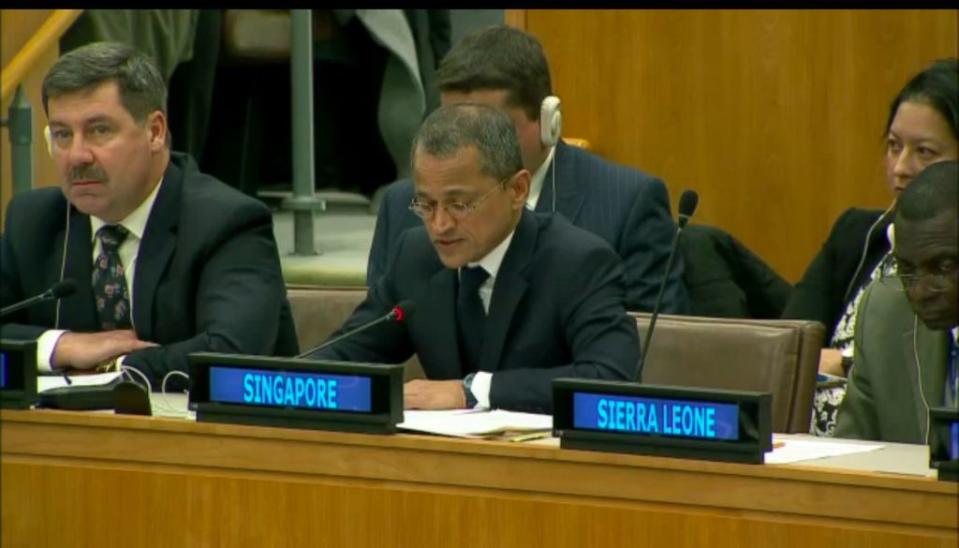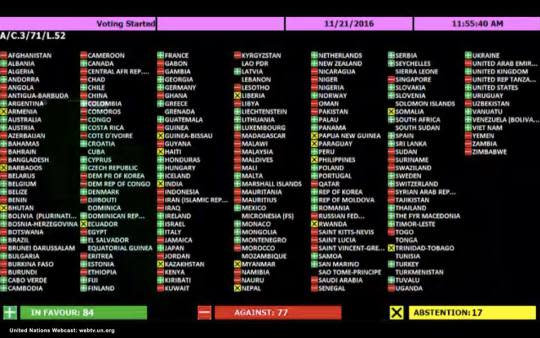Singapore Voted Against Safeguard To Protect LGBT Discrimination: Here’s Why It’s Tricky

You may have heard reports that Singapore voted Monday against an independent expert used as a safeguard to oversee protections against LGBT violence and discrimination.
Yes, Singapore voted against it and the bill was eventually passed in an 84-77 vote, but it’s a bit tricky. Let us explain.
The United Nations Human Rights Council passed a resolution on Jun 30 as part of an annual report, to appoint an independent expert on protection against violence and discrimination based on sexual orientation and gender identity (SOGI).
However, an African Group led by Botswana lobbied early this month to hold the appointment until the next General Assembly session to allow more time for consultations. The country also said international law did not specify the terms “sexual orientation” and “gender identity” and did not universally recognise it as part of human rights.
As such, the African Group believed the expert did not have the specificity to carry out his duty.
Eight Latin American countries – seven of them which initiated the June resolution – fought back to restore the clause, saying that allowing Botswana’s request means that the General Assembly would undermine the authority it granted the Human Rights Council. A Botswana human rights activist stressed the resolution affects the safety of real lives.

Singapore was the only country in the International Monetary Fund’s list of advanced economies that voted against the resolution. All other members voted for it.
Singapore is also one of only three ASEAN countries that voted no (Malaysia and Indonesia also voted no) and one of five Asian countries that voted no (China and North Korea also voted no).
In explaining the vote, Ambassador Burhan Gafoor (photo above), permanent representative of Singapore to the United Nations, said that the General Assembly should be the platform to consult other states who are not on the Human Rights Council. Although this supersedes the Council’s authority, Gafoor disagreed and said it represented an opportunity for more dialogue.
“As a country that has never served on the Human Rights Council… we believe strongly that the General Assembly has the prerogative and the responsibility to discuss important issues relating to the work of the Human Rights Council, particularly when they are questions and concerns raised by a large number of states,” Gafoor said.
However, Gafoor believed that the issue of LGBT rights is divided internationally and must be decided by individual countries.
“We believe this is an issue best left to each society to deal with in its own way, taking into account its evolving social and cultural context,” he said.
Gafoor stressed the vote was not representative of Singapore’s position towards LGBTs. He reinforced Singapore’s commitment against violence and discrimination towards LGBTs and noted that there are such laws and they are enforced “strictly and impartially”.
A summary of the meeting can be read here, and the meeting can be viewed via video here.
==
Featured photo: UN Web TV
Stay updated and social with Popspoken: Facebook | Twitter | Instagram
—
Below is a transcript of Ambassador Gafoor explaining Singapore’s vote before voting:
“Thank you very much, Madam Chair. I wish to make an explanation of vote before the vote on the proposed amendment contained in document L.52.
I’d like to start by reaffirming Singapore’s commitment to, in support for the Human Rights Council, which has an important responsibility to promote and protect all human rights and fundamental freedoms.
Madam Chair, we’ve studied carefully the explanatory note circulated by the African group as well as by the group of Latin American countries which have proposed the amendment. I’ve also listened very carefully to the various general statements made this morning, and I’ve listened to them with great respect, so this is not a decision that we in Singapore have taken very lightly but we have only done so after very careful consideration.
From Singapore’s point of view, the decision facing us today is essentially a decision on the nature of the relationship between the General Assembly and the Human Rights Council. For Singapore, the issue boils down to a fundamental question: can the General Assembly pronounce itself on the work of the Human Rights Council?
In our view, the answer is yes. The Human Rights Council is a subsidiary organ of the General Assembly, as clearly stated in GA resolution 62/51 and reaffirmed in GA resolution 65/281. The UN charter clearly affirms that the General Assembly may discuss any questions or any matters within the scope of the charter, or relating to the powers and functions of any organs provided for, in the charter.
Accordingly, we believe that the General Assembly has the right and the responsibility to pronounce itself on the work of the HRC, including on the work of the special procedure mandate holders. Furthermore, as the only United Nations body with universal membership, the General Assembly has an important role to play in promoting dialogue, bridging differences and building consensus to find solutions that reflect the views of the wider UN membership.
As a country that has never served on the Human Rights Council, and given the increasing challenges faced by many small states in securing a seat in the Human Rights Council, we believe strongly that the General Assembly has the prerogative and the responsibility to discuss important issues relating to the work of the Human Rights Council, particularly when they are questions and concerns raised by a large number of states.
Singapore opposes the amendment because we believe it is important to reaffirm the right of the General Assembly to express its views on the work of the Human Rights Council. The deletion of OP2 will also have the effect, in our view, of preventing discussion among the wider UN membership on an important issue.
Additionally, from a legal and institutional point of view, the deletion of OP2 would imply that the General Assembly’s role as the overseeing body of the Human Rights Council is nothing more than symbolic.
We do not see OP2 as questioning the mandate and authority of the Human Rights Council to create special procedure mandate holders. Instead, we look at OP2 as a proposal that seeks further information and dialogue on an important issue, namely the issue of sexual orientation and gender identity (SOGI). We do not see the inclusion of OP2 in L.46 as prejudging the outcome of consultations on these concerns.
We believe that the integrity, credibility and legitimacy of the human rights system will be strengthened, not weakened, if we allow for greater dialogue in order to widen the circle of consensus on difficult and challenging issues.
Madam Chair, for all of the reasons I have explained, Singapore will vote against the amendment in L.52, which calls for the deletion of OP2 in L.46.
Madam Chair, I wish to place on record, the position of my government that we do not see the decision on whether to retain OP2 as relating to the substance of the issue of sexual orientation and gender identity. We do not condone the discrimination of any group, any individual in any society.
In Singapore, we respect the LGBTI community as an integral part of our society. In this regard, we wish to reiterate that Singapore strongly opposes violence and discrimination against LGBTI persons. In Singapore, we have laws to protect our citizens from such acts and we enforce these laws strictly and impartially.
In our view, violence against any group in any form is not acceptable and the Singapore government will act decisively, as it has always done if there is a threat of violence against anyone or any group. The issue of the rights of LGBTI persons is one upon which international opinion is clearly divided.
We believe this is an issue best left to each society to deal with in its own way, taking into account its evolving social and cultural context. I thank you very much, Madam Chair.”
—
Below is a transcript of Singapore’s explanation after the vote:
“Thank you Madam Chair. My delegation wishes to make an explanation of vote after the vote on resolution A/C.3/71/L.46.
We note that the majority of states have decided to vote on favour of the amendment proposing to delete OP2 from L.46. In our view, this is a missed opportunity to engage in consultations on an important issue that has been dividing the UN membership, and to seek a way forward based on consensus.
Nevertheless, Singapore has consistently supported and voted in favour of the African Group’s annual resolution on the report of the Human Rights Council.
In view of the fact that the HRC is a subsidiary body of the General Assembly as stipulated by GA resolution 62/51 and 65/281 and is required to submit an annual report to the General Assembly, it is only appropriate for the General Assembly to continue to take note of the report of the HRC as it does every year.
For this reason, Singapore voted in favour of resolution L.46 as amended. I thank you, Madam Chair.”
This article Singapore Voted Against Safeguard To Protect LGBT Discrimination: Here’s Why It’s Tricky appeared first on Popspoken.

